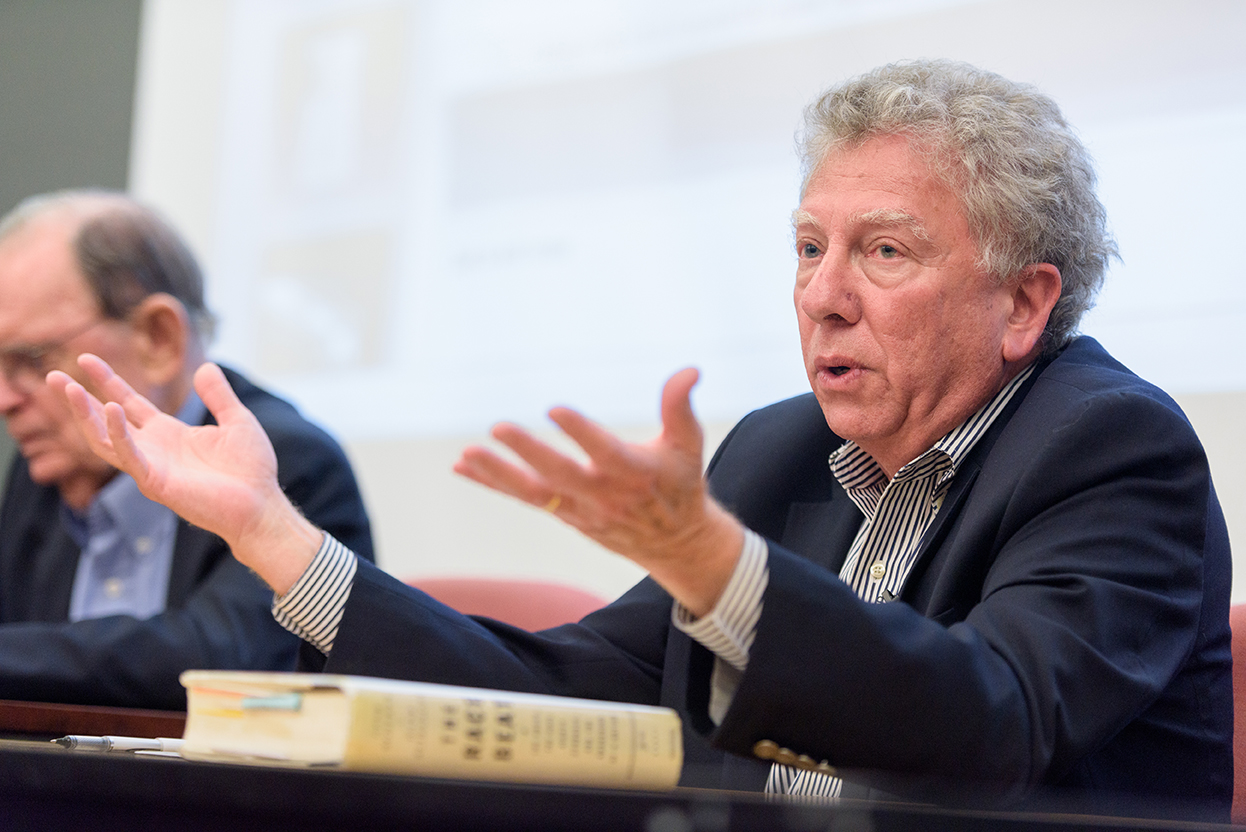

Reporting on race
Photos by Evan Krape May 16, 2017
Veteran journalists discuss coverage of civil rights movement
For a little over an hour in the University of Delaware’s “Reporting and Race” journalism class, it was a different era — a time when life in the South was strictly segregated, when Americans got their news from print newspapers and when those papers almost universally ignored African American communities and issues.
Veteran journalists Gene Roberts and Hank Klibanoff spoke to the class in Gore Hall on May 11, describing their own experiences as reporters and what they learned in researching their Pulitzer Prize-winning book, The Race Beat: The Press, The Civil Rights Struggle, and The Awakening of a Nation.
“When you picked up a newspaper, what you got was a picture of white life in America, not diversified life in America,” Roberts said of the years before the civil rights protests that began in the late 1950s. “Essentially, you had two societies — one white and one black — and one was covered in the [mainstream] press and the other was not.
“For better or for worse, newspapers reflect society, [and] the whole definition of news was a white definition.”
But that started to change, he said, with such events as the 1960 lunch counter sit-ins by African American students in Greensboro, North Carolina, seeking to end segregation in public accommodations. Mainstream newspapers, with all-white staffs who had covered traditional beats that largely excluded African Americans, began sending reporters to write about the growing civil rights movement.
Roberts recalled for the class his own work as a reporter in 1960, when he went to an African American church in Greensboro to hear the visiting Rev. Martin Luther King speak about the sit-ins and the movement. The church was filled to overflowing, Roberts said, and he was able to hear the speech only by being boosted up to an open window, where he perched on the sill and listened to King.
Describing the enthusiastic crowd and the donations being dropped into the collection plate that night, Roberts said he immediately reconsidered his previous opinion that the South would never change in his lifetime.
“After seeing this audience respond to Martin Luther King … I came away convinced that I was going to see massive change. And we have seen massive change,” he said.
Klibanoff called the first Greensboro sit-in “the most important story in American history that no journalist saw” because mainstream newspapers had not yet started covering civil rights issues or the African American community in general. The story of the protest got told initially, he said, only because a student newspaper talked to the participants after the sit-in and wrote an article about it.
African American newspapers, in cities such as Chicago and Baltimore, did cover the civil rights movement, he said, before the mainstream press joined in.
“The black newspapers were on the front lines,” Klibanoff said, in a “difficult, violent time” where reporters of any race risked being attacked.
“There was enormous fear, and it was justified fear,” he said, as Southern segregationists often blamed the press for encouraging the civil rights movement’s continued growth.
The coverage by Northern and national newspapers in addition to some courageous Southern editors, Klibanoff said, helped give federal officials an incentive to take action to enforce equal-rights laws and, ultimately, to end the Jim Crow system of mandated segregation.
About the speakers
Roberts and Klibanoff were invited to the class by Dan Biddle, instructor in English and a former politics editor for the Philadelphia Inquirer, who told his students the two are “giants of American journalism.”
Biddle said The Race Beat, published in 2006, demonstrates that “how the press covered the civil rights movement is a great story in itself.”
Roberts covered the civil rights movement and the Vietnam War for The New York Times before leading the Philadelphia Inquirer to 17 Pulitzer Prizes in his 18 years as executive editor. He writes frequently about issues central to the country’s future and is the subject of a forthcoming documentary, The Newspaperman.
Klibanoff was an Inquirer national correspondent, business editor and deputy managing editor and later served as managing editor of the Atlanta Journal-Constitution.
Both men went on to become professors of journalism, Roberts at the University of Maryland and Klibanoff at Emory University, where he directs the Georgia Civil Rights Cold Cases Project.
To read an account by journalism students of the speakers' visit to UD, visit this website.
Contact Us
Have a UDaily story idea?
Contact us at ocm@udel.edu
Members of the press
Contact us at 302-831-NEWS or visit the Media Relations website





